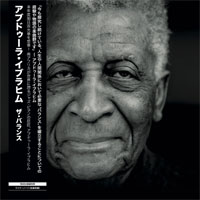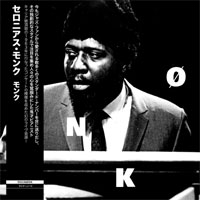Abdullah Ibrahim • The Balance Gearbox Records GB1554OBI
Thelonious Monk • Mønk Gearbox Records GB1554OBI
n the wake of the great vinyl resurgence that has spread worldwide, independent record labels have hustled to satisfy a growing appetite. Among these is Gearbox Records, a label located in London, England, founded by drummer, record collector and businessman Darrel Sheinman. Since its beginnings in 2009, Gearbox has become a producer of carefully curated and crafted original contemporary jazz, electronic and ethnic/folk recordings, as well as archival jazz gems from the past, featuring Tubby Hayes, Ronnie Scott, Yusef Lateef and Thelonious Monk. The label also maintains a mastering studio (next door to Mark Ronson’s Zelig Studio) in London’s King’s Cross and has recently introduced a very affordable, see-through, plug-and-play turntable, the Gearbox Automatic Mk II, which is built by Pro-Ject. The proximity to the studio enables Sheinman to record artists on 1/2” or 1/4” tape, or, the audiophile's choice, direct-to-disc. With close to three dozen titles in its catalogue, Gearbox is on the move, and it continues to release new LPs. Jazz icon Thelonious Monk’s estate authorized release of this previously unknown live concert. Captured on tape was Monk’s 1963 quartet -- Charlie Rouse on tenor sax, John Ore on bass and Frankie Dunlop on drums --- at the height of its creativity and notoriety on stage in Copenhagen. Indeed, the following year, Monk appeared on the cover of Time magazine, one of only five jazzmen to be so honored. Gearbox has mastered Mønk from those original master tapes, with the lacquers cut using an all-analog chain that includes a vintage Haeco Scully lathe. Because Mønk was recorded, mastered and pressed in mono, I swapped my Dynavector stereo cartridge for an Audio Technica mono cartridge to optimize playback. After the needle dropped on the album’s opening track, “Bya-Ya,” I knew I was in for a treat, as I listened to Frankie Dunlop’s beautifully recorded, dynamic drums on this newly discovered classic. Grinning, I quickly settled into my seat for the duration of side one. Rouse, as usual, offers a dependable and idiosyncratic solo followed by Monk’s puckish, acrobatic piano. Despite the surprisingly plodding bass of John Ore, the excitement of the performance is not dampened -- due perhaps to Dunlop’s tasteful drumming keeping everything and everyone on course. Monk’s “Nutty” follows with a rousing solo from Rouse and prototypical Monk for close to ten minutes of compact, innervating jazz. Side two presents Rouse in an assault on the changes to “I’m Getting Sentimental Over You,” demonstrating the close artistic relationship with Monk. The two seem almost to share the same genes. Meeting the challenge, Monk is all over the keyboard in an amazing solo. The rhythm section of Ore and Dunlop keep this rockin’ ship afloat. The second track, presenting Monk in an unaccompanied version of “Body and Soul,” is a delight for the ears and heart, despite tape-speed issues. Monk disassembles and then reconstructs this evergreen in his own unique, inimitable way. Finally, the leader's popular “Monk’s Dream” is an object lesson in small-group jazz. The players work through the jaunty melody as if of one mind, always swinging. Gearbox has uncovered a real gem of an album here, which any Monk fan will want in his or her collection. Abdullah Ibrahim’s The Balance offers an equally exciting taste of jazz, this time flavored with a world beat. Known previously as Dollar Brand, Ibrahim was well over 80 when he entered London’s RAK Studios to make this album, but it would be hard to tell, given the music's energy. With support from his group Ekaya, he presents a wide variety of music, ranging from the township jive of “Jabula” to the avant “Tuang Guru” to his solitary meditations on tunes such as “Tonegawa” and “Devotion.” The album’s opener, “Dreamtime,” features the flute of Cleave Guyton, Jr., along with sensitive piano accents by Ibrahim. Such is the immediacy of the recording that you can hear the flautist’s every breath, lending a sense of presence to the proceedings. The full ensemble is heard next on “Nisa,” laying down a closely voiced riff in support of the piano. Ekaya member Marshall McDonald contributes a nice baritone-sax solo, as does Andrea Murchison on trombone. The sound is tight and the music is bright, the entire group pitching in. “Jabula’s” catchy melody and infectious rhythm reminded me of the Dollar Brand of the late 1970s albums Soweto and Echoes From Africa, and 1994’s remarkable African Marketplace. The next song brought a pause, though, as the frantic pace and nimble acoustic bass of Noah Jackson and cymbal work of drummer Will Terrill shifted my attention to the piccolo (!) solo, “croaking” baritone sax, wailing tenor sax and trombone outbursts on a tune that lingered in my acoustic memory. The side’s closer, “Tonegawa,” is a pensive, contemplative piece for Ibrahim alone, featuring his lyrical side. It ends as mysteriously as it began. Side two’s opener, “Song for Sathima,” revisits Ibrahim’s signature composition. It is a lovely eulogy, written for Sathima Bea Benjamin, Abdullah’s late wife and well-known South African singer and composer. The lyric beauty of the song is enhanced by Lance Bryant's fine tenor-sax solo. “Z82” is a short, sweet piano solo laced with a bit of whimsy. Next comes an instantly recognizable Thelonious Monk tune, “Skippy,” with the theme carried by piccolo. There are solos all around, with Noah Jackson’s bass and Will Terrill’s drum solos especially notable. The tune really does seem to skip along. “Devotion,” as its name implies, is a short, beautiful meditation for Ibrahim’s solo piano. It revisits the Dollar Brand artistry of earlier times. Finally, the title tune is a whimsical jaunt with the odd instrumentation of cello, harmonica and flute. The unusual combination of timbres works well for this number, which features a catchy melody and intriguing sound textures. The packaging and presentation of these LPs are
exceptional -- encased in resealable clear sleeves, the records are presented in heavy,
laminated cardboard outer jackets adorned with black-and-white photos on the front and
additional photos, session information and notes (in Japanese) on the back. The LPs,
pressed at Optimal in Germany, are nestled in sturdy, poly-lined inner sleeves. They are
heavyweight, ruler-flat and dead quiet. Both LPs have Japanese liner notes and OBI strip.
They are marketed primarily for Japan-based customers, but Gearbox has made limited
quantities available to the rest of the world via their online shop. |


